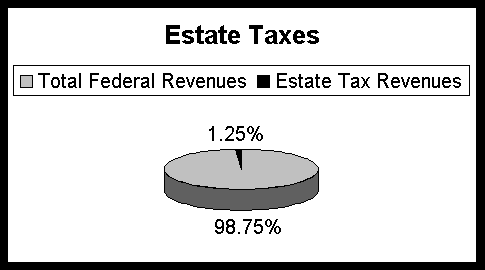.gif) |
 Printer friendly version of this
page Printer friendly version of this
page

Federal Estate
and Gift Taxes Hurt Smaller Manufacturers and the U.S.
Economy
| True or False? The
costs of federal estate and gift taxes kick in only when a
business owner dies.
False.
Manufacturers pay high amounts annually to plan for estate-tax
liability. These costs result in lost productivity, lower
investment and fewer jobs.
|
As we enter a new century, the U.S.
economy is achieving unprecedented levels of prosperity, innovation
and job creation. American manufacturers and their workers are
leading the charge. The higher American standard of living can be
traced directly to new technologies that increase productivity.
Manufacturers are responsible for 57 percent of the economy’s
technological advance. Putting in place policies that enhance
technology and productivity are key to sustaining the economy’s
long-term growth.
Yet despite this economic progress, the
federal estate and gift tax regime — sometimes called the death tax
— undermines every aspect of the growth economy for small
manufacturers.
As the chart on the back shows, estate
and gift tax collections are a miniscule portion of federal
revenues. Only once in the past 25 years have tax receipts from
these sources ever reached 2 percent of all federal receipts; today
they are only about 1 percent. But their impact on the economy — and
small manufacturers — is huge.
From a cost/benefit point of view,
these taxes are damaging to the nation’s economic growth in several
ways:
- Small companies are targets.
Among manufacturers, it falls almost entirely on smaller firms
because large public companies are not affected by the tax. In
fact, when a small company owner dies, the beneficiary is often a
larger, publicly traded company that buys up the pieces. The
result is less competition in the marketplace and, often, a
transfer of jobs as the larger company consolidates operations.
- The costs of the estate tax occur
every year, not just upon death.
Family-owned manufacturers
spend large amounts of scarce capital every year on estate
planning to deal with future estate-tax obligations. It is not
unusual for even a small company to pay hundreds of thousands of
dollars a year just in insurance premiums and more for legal,
accounting and annual appraisal fees.
- The estate tax saps economic
growth.
Expenditures on estate planning mean there is less
capital for new equipment and new technology that boost
productivity, new jobs and employee training. A manufacturer with
only 50 employees generally operates equipment costing anywhere
from $100,000 to $1,000,000 a machine. Cash diverted to estate-tax
planning leaves less for investment.
- Business planning is supplanted by
tax planning
. Instead of forward-looking planning to expand,
manufacturers are forced to deal with a future estate-tax
liability by structuring their companies to allow a partial
sell-off of divisions, ceasing acquisitions and increasing debt to
lower the value of the company. In the absence of this tax, small
manufacturers would spend these resources on staying globally
competitive.
- At death, the tax eliminates
jobs
. At the death of a founder, a small manufacturer often
incurs millions of dollars in tax liability. To pay the tax,
assets and product lines are often sold off, with resulting
layoffs. Since most assets in manufacturing companies are not
liquid capital but buildings, inventory and machine tools, these
are the assets that the estate tax forces out the door.

Source: Joint Committee on
Taxation
The Manufacturing Institute is the
research and education affiliate of the National Association of
Manufacturers. For more information, contact The Manufacturing
Institute at (202) 637-3107, e-mail us at mfg.inst@nam.org, or visit our Web
page. |
.gif) |
 Printer friendly version of this
page
Printer friendly version of this
page




